New Day for an Old Store | The Etna Country Store in Etna, New Hampshire
A village store is often the heart of a small community. It takes commitment and a special love to keep it alive.
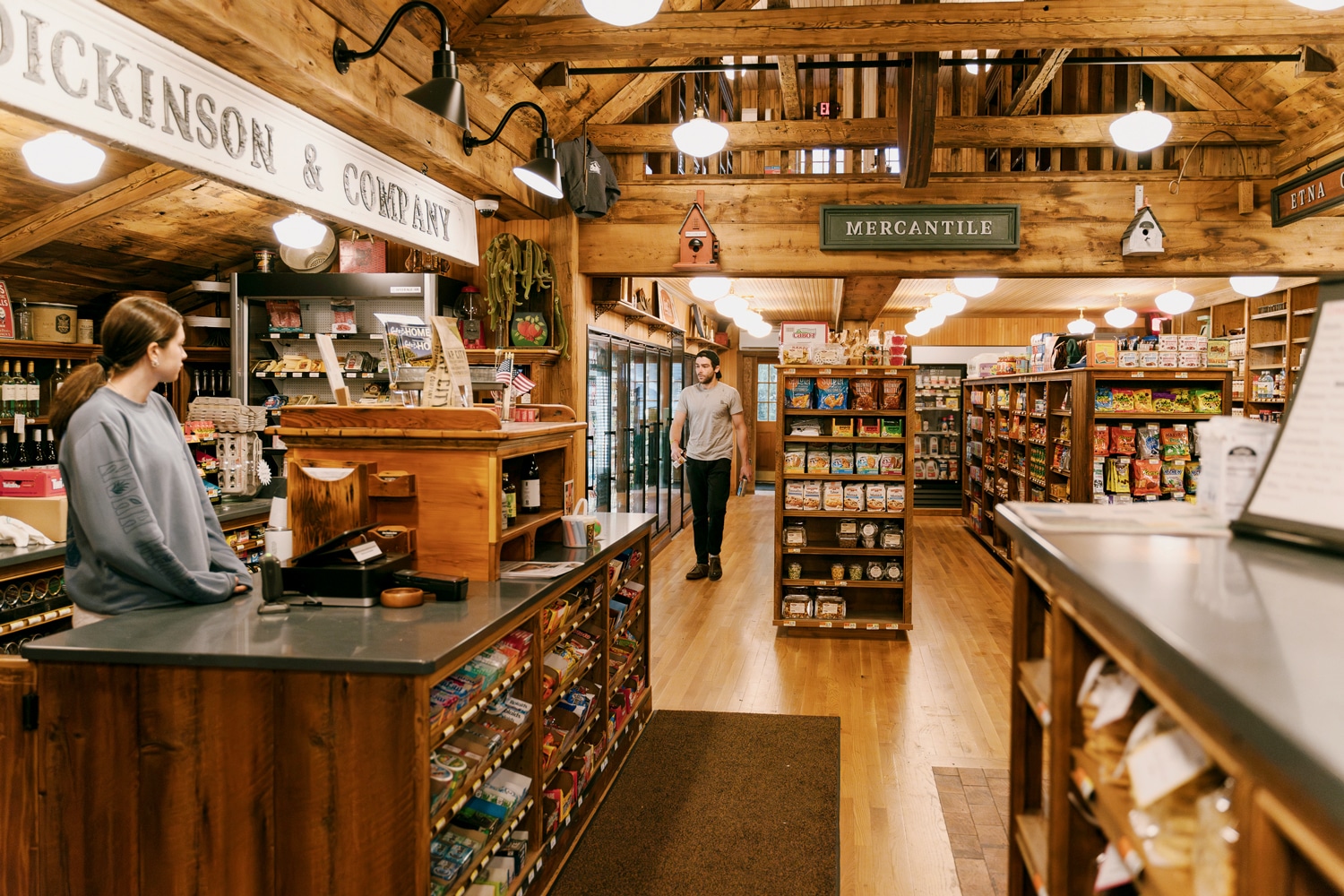
The interior of the Etna Country Store in Etna, New Hampshire, which was reopened in 2022 by Tyler and Kayla Dickinson after two years of renovations.
Photo Credit : Kelly BurgessIf you drive east out of Hanover, New Hampshire, following the twists and turns of Greensboro Road as it unfurls across a landscape of soft-domed hills and well-maintained country homes, many of them separated from the road by stone walls representing generations of earthbound toil, you’ll soon find yourself in the village of Etna, where the population is 770, 814, 870, or 962, depending on which source you’re inclined to believe. The town stretches itself along the banks of Mink Brook, and its center is ill-defined, though if one were pressed to define it, one could do worse than to mark the very spot where I park my car on a Friday morning in early June.
Above me, daylight rushes to fill the sky; below me, down a steep bank, the steel-colored waters of Mink Brook rush to join those of the Connecticut River; before me, through the front door of the establishment I’ve come to visit, Tyler Dickinson rushes to prepare for the opening of the Etna Country Store. It’s 5:48 a.m., and already he’s been working for nearly two hours, tidying up, making coffee ready for the store’s 6 a.m. opening. Tyler is 40 years old; he was born and raised in Etna, where nearly three decades ago he could have been found in precisely the same spot, at the tender age of 14, working his first job at the same village store he would someday own with his wife, Kayla.
But that was then and this is now, and it’s four minutes to 6. The warming station is loaded with Tyler’s popular chorizo breakfast sandwiches wrapped in foil. The coffee dispensers are full, and the machine is gurgling its way to a replacement pot. There are eight more minutes’ worth of daylight warming the sky, and down the steep bank behind the store, the Mink is still churning along, having deposited eight more minutes’ worth of water into the Connecticut. A truck pulls up to the front of the store, and a young man disembarks. Tyler situates himself behind the register. He looks relaxed. He is smiling. He greets the man.
There are 11 hours and two minutes to go before closing time, and his first sale of the day will be a $2 cup of coffee.
* * * * *
When I was young, we lived exactly one mile up a steep gravel road from a small village store that was attached to the post office where we received our mail. The store was (and still is, for that matter) called the Maple Corner Store, and at the time it was owned and operated by a family that seemed old to me then but would probably seem young to me now. I remember that the man’s name was Orville, likely because Orville is a memorable name, and I remember that he struck me as gentle and shy, although that could also be because I was rather gentle and shy myself, and therefore didn’t give him much to work with.
The Corner Store (as we called it) was a popular destination for me and my friend Trevor. Both of us belonged to households where sugary treats made infrequent appearances, so the store, which was well stocked with all the treats a sugar-deprived boy could want, shone like a beacon to us. This was back in the day when the term “penny candy” actually meant candy that could be purchased for a penny per piece, which meant that a small (or not-so-small) bag of Tootsie Rolls, Root Beer Barrels, Bit-O-Honeys, Everlasting Gobstoppers, and Atomic Fireballs was almost always within our means. We’d speed down the long hill toward the store, pockets full of loose change and heads full of what we could buy, then push our bikes back home, pausing every so often to root around in our newly acquired bag of goodies.
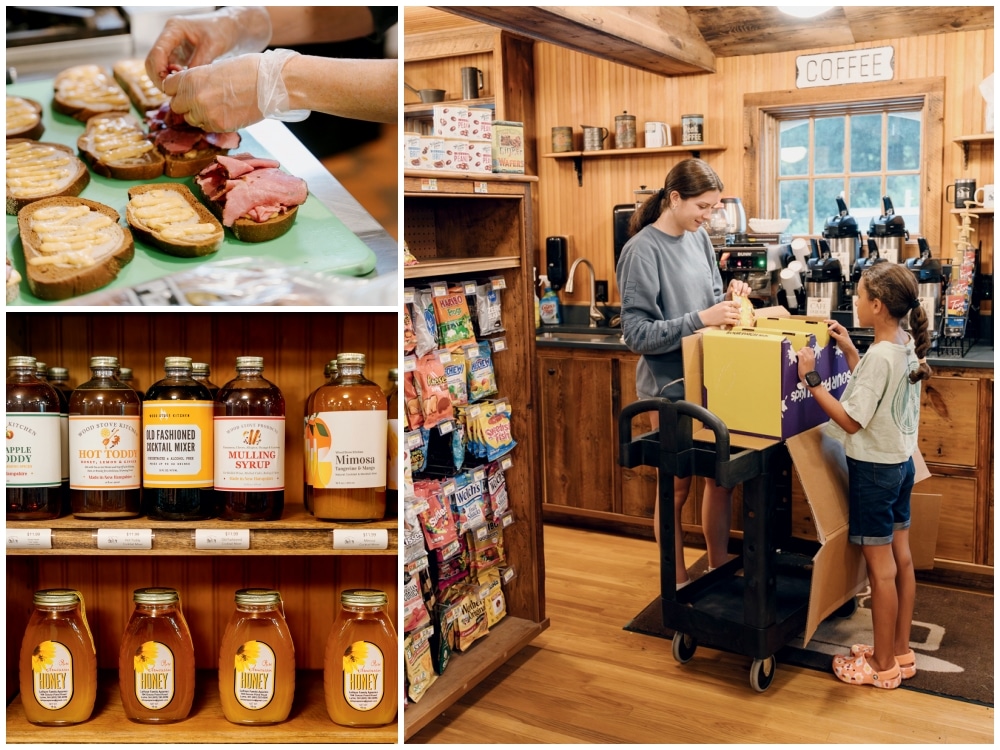
Photo Credit : Kelly Burgess
Growing up, I never thought much about the Corner Store’s foundational role in my life, despite the frequency of my visits. It was always just there, offering its bounty to all—gallons of milk, emergency rolls of toilet paper, daily mail—as steadily and reliably as the rising sun. I had no particular appreciation for the store; it felt unremarkable in the way that so many things that actually are pretty remarkable can come to feel once the curse of familiarity settles in.
What I didn’t know then—what nobody knew, really, in that innocent, pre-Amazon era—is just how precarious that familiarity was. A formal diagnostic report on New England’s country/village/general store industry (the qualifier depends mostly on regional and even individual preferences; I’ve chosen to use “village” throughout this story) is hard to come by, but it’s telling that in Vermont alone, the number of “country stores, general stores, and village stores” dropped from 245 in 2009 to 180 in 2019, a decline of more than 25 percent in just 10 years. This is not likely to surprise anyone with Internet access and an Amazon Prime account; after all, who among us can resist the siren call of one-click shopping and unlimited free shipping for only $139 annually, including access to more streaming entertainment than you could likely squeeze into a year’s worth of waking hours?
Yet over the past half decade or so, I began to notice a curious shift, as numerous village stores underwent revitalization. Some were being reopened after having been shuttered for years; others were finding new owners, many of them young and ambitious, and eager to make their mark. This trend first caught my attention when the very store whose penny-candy jars I pillaged as a child went up for sale, and, after some initial struggling to find a buyer, was ultimately purchased by a group of 200 community shareholders. There were others: Davoll’s General Store in South Dartmouth, Massachusetts, which at 231 years old is one of the oldest general stores in the U.S., was purchased in 2021 and renovated by two brothers who had frequented the store as children. Not far from my home in Vermont’s Northeast Kingdom, the long-vacant Albany General Store was recently purchased by a community trust and placed under the management of the same three young women who had successfully revitalized the Craftsbury General Store (known locally as “The Genny”) only a few miles down the road. Clearly, there were at least a few people ready to place their stake in their local community.
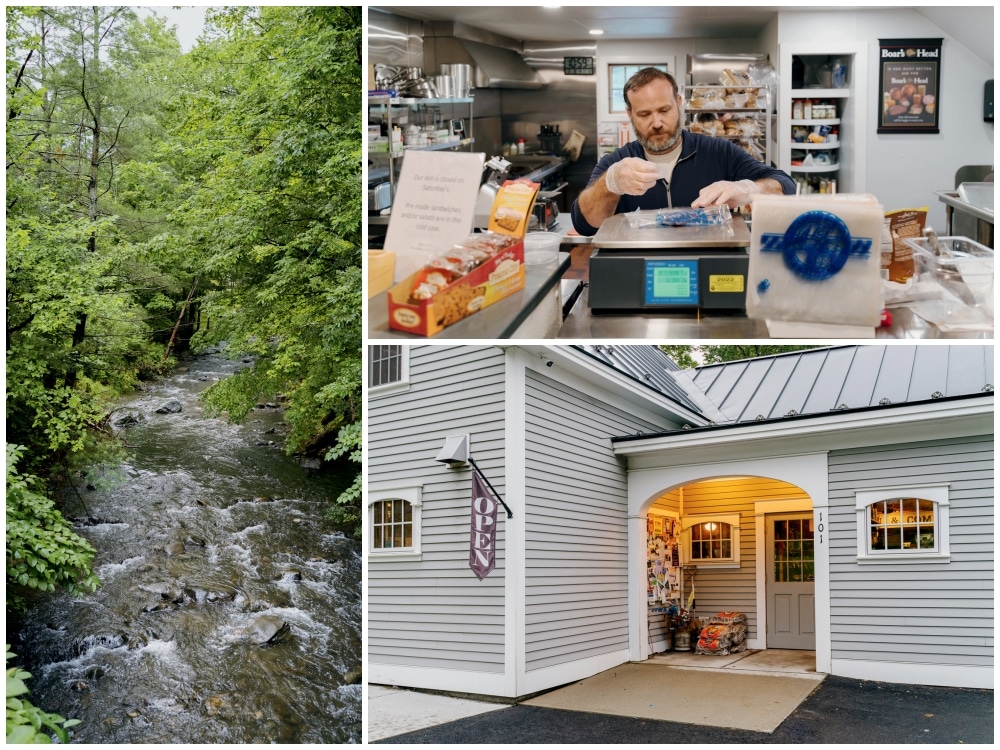
Photo Credit : Kelly Burgess
Including, of course, Tyler and Kayla Dickinson, who in 2020 fled their relatively lucrative corporate jobs (plumbing and heating wholesale for Tyler, bank management for Kayla) so that they could refurbish, restock, and reopen the Etna Country Store. At the time, the building sat dormant and was owned by Tyler’s father, Rick, who’d purchased it in 1986 during another period of dormancy. Back then, Etna—which is officially a hamlet of nearby Hanover—was considered a bit of a hardscrabble community, the town you lived in if you couldn’t afford to live in Hanover, or if you’d been born in Etna and hadn’t really figured out how to leave. That reputation had slowly been fading over the intervening decades, and then disappeared altogether in a single, pandemic-induced whoosh, when suddenly half of New York and Boston’s populations seemingly got a hankering to move to the country. Indeed, the modest house across the road from the store recently sold for $950,000, a sum that would have been unheard of in Etna only a few years ago.
For Tyler, the opening of the store on July 28, 2022, was the realization of a long-held dream. “Ever since I’ve known Tyler, we’d drive by and he’d say, ‘I would love to make that happen,’” Kayla tells me. For her, it was a path out of banking and a way to become more connected to the community she lives in and loves, as well as to her own memories of how a village store can shape a person’s life. She’d grown up in Brownsville, Vermont, where she’d stop at the Brownsville General Store every day after school for a Popsicle. “I loved growing up there, and the store was part of what I loved.”
Of course, love alone won’t pay the bills, and Tyler and Kayla were keenly aware that they were doing something audacious in reopening a village store in a community of fewer than 1,000 residents situated only a handful of miles from Hanover, where, at the long-established co-op grocery, one can wander well-lit aisles stocked with all the food items any Etna resident might reasonably desire, and probably a few more besides. What’s more, they were doing so while raising a family in the midst of a global pandemic (they now have three children, Ainsley, 8, Nora, 2, and Brooks, 1). And they were opening a village store in the very location that had seen numerous others attempt to do the same and, in many cases, fail.
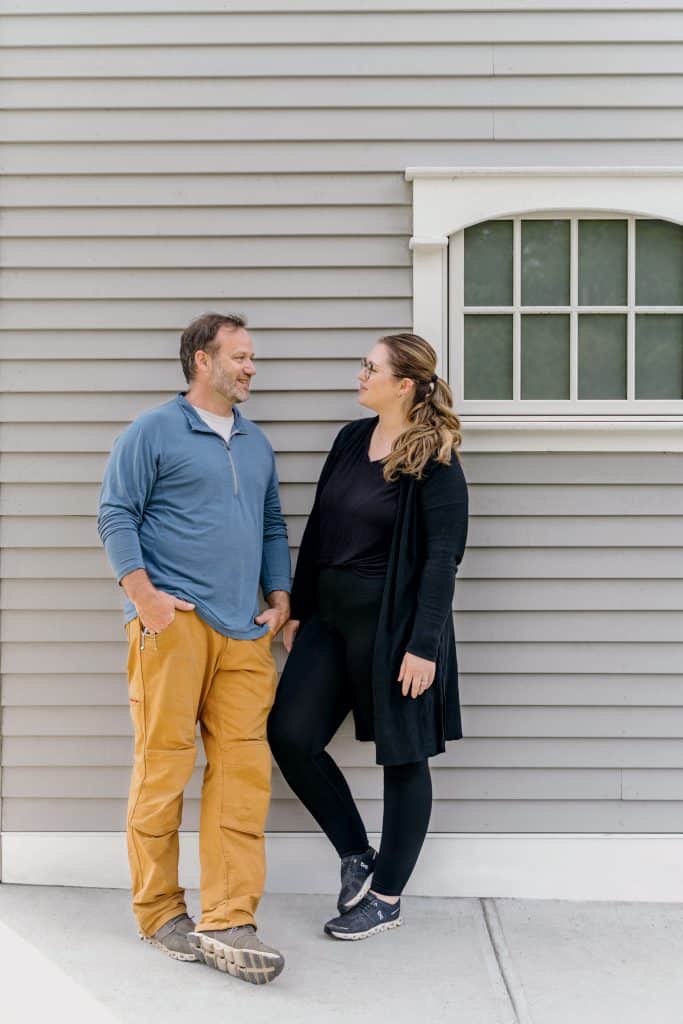
Photo Credit : Kelly Burgess
So perhaps it wouldn’t be love alone that allowed the Dickinsons to succeed. Nor would it be an existing model of success that they could simply replicate, since that didn’t seem to exist. What, then, could they rely on to help ensure the viability of their new venture? It’s simple, really: The Dickinsons were prepared to work harder than anyone who’d come before. “Our family is just stupid about working,” Tyler tells me, with the hint of a grin on his face. “My father grew up very poor and constantly working, and I grew up seeing that it was totally normal to always be working. And it’s never worn off.”
* * * * *
Here is a partial list of the items you can buy at the Etna Country Store: cat litter, Aqua Net hairspray, diapers, Mike’s Hard Lemonade, Lawry’s Lemon Pepper Marinade, dried dill, PopZup popcorn, a dust pan, candles with a scent known as “Welcome to the Shit Show,” and, of course, the gallon of milk you forgot to pick up at the grocery store in town. You can also buy Cool Whip, Boston cream doughnuts, and toilet paper. You might decide on the Maple Combo sandwich (in fact, I recommend it) and a bag of Wrap City potato chips, which are made less than 90 miles away and are likely to ruin your taste for more pedestrian offerings. You can buy a lot of beer and wine; Tyler and Kayla soon realized that beer and wine were hot sellers, so they have continually expanded their offerings and begun to host regular tasting events. “When people get into the wine section, that’s when we start smiling,” Tyler says. “Because you have to sell a lot of gum and iced tea to pay the bills.”
And herein lies arguably the greatest challenge facing the Dickinsons and, presumably, any other village store proprietor: Most transactions simply don’t add up to much. The majority of purchases I witnessed revolved around three common items: coffee, breakfast sandwiches, and soda. And yet the Dickinsons know that if they don’t stock the less commonly purchased items, they risk losing customers who become frustrated that they can’t find, say, the exact scented candle they were looking to purchase. “Right now, we’re bleeding money trying to figure out what works,” says Tyler. “We’re basically broke and in debt up to our asses. I don’t think people understand just how invested we are.”
That investment includes the simple fact that the entire family spends more of its waking hours at the store than anywhere else. They’ve created an upstairs room that serves as an office, a playroom for the kids, and a brief refuge from the never-ending stream of tasks awaiting below. Tyler is generally the first to arrive at the store, in those dark, predawn hours; Kayla will get the kids up, send Ainsley off to school, and arrive at the store usually by 8 a.m., often with Nora and Brooks in tow. At the end of her school day (at the same school Tyler attended as a child), Ainsley rides the bus to the store, where she alights to join the rest of her family. Steady help has been hard to find (never mind afford), so the store, which is open 74 hours each week and demands roughly an equivalent amount of attention outside its normal operating hours, runs primarily on Tyler and Kayla’s labor. It is not much of an exaggeration to say that the store has consumed their lives.
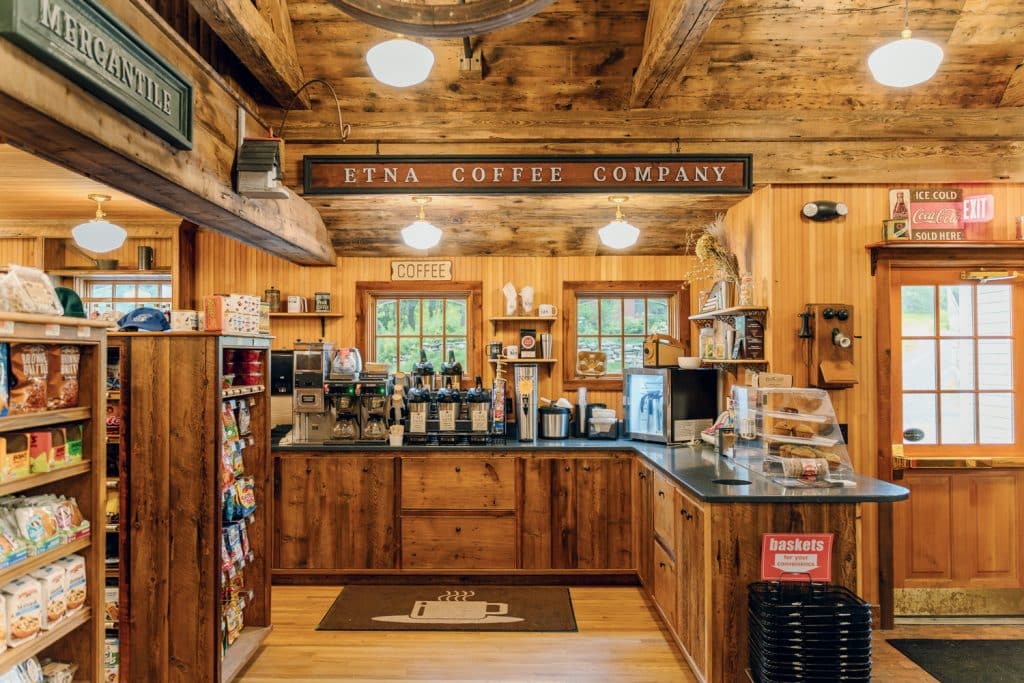
Photo Credit : Kelly Burgess
And yet there are compensations. There’s the inherent satisfaction of hard work, and the well-earned pride of overcoming obstacles. There’s the pleasure of working together as a family, and the sense of belonging that comes of having rooted oneself in a place and of committing to that place. There are the relationships with fellow community members (by my rough count, Tyler and Kayla knew the names of at least 80 percent of the customers who walked through the door while I was there), and the fulfillment that comes of serving the community, not only as a resource for an emergency roll of toilet paper, but also as a place to congregate, and to share the small news of this small town. Perhaps more than anything else, this is what the Dickinsons are contributing to the community they love: a place to co-create the story of what it means to live in Etna, New Hampshire, in the early part of the 21st century.
By the time you read this, the Etna Country Store will have been open for about a year and a half. If you’re reading this anytime between the hours of, say, 4:30 a.m. and 8 p.m., Monday through Saturday, it’s a pretty safe bet that at least one of the Dickinsons will be on the premises, preparing food, stocking shelves, cleaning up, talking to customers, maybe even stepping outside for a moment to feel the sun on their face and listen to the gurgle of Mink Brook. Maybe, if you’re in the area, you’ll stop by. Maybe you’ll grab a cup of coffee and one of those incredible chorizo breakfast sandwiches. Tyler would be very pleased if you’d consider a bottle of wine or two, perhaps a six-pack of craft beer, maybe even a novelty scented candle. If you’re able to pay with cash, that’d be great—those pesky credit card transaction fees really add up, and can make the difference between realizing a profit and barely breaking even.
Still, maybe the most important thing you can do is take a moment to consider everything a business like the Etna Country Store brings to its community, and how much poorer all of our lives would be without these stores. And furthermore, just how fragile an existence it really is, even for owners as committed and hardworking as the Dickinsons. “I think I can speak for both of us when I say that I don’t think we’d do this again,” Tyler tells me during my second visit to the store. “At the same time, we don’t regret it for a second.”
A car pulls into the lot, the front door opens, and a middle-aged man walks in. “Marcus! What are you getting up to today?” Tyler asks. And Marcus stays awhile to tell him.
5 More New England Country Stores Reborn
Harrisville (NH) General Store
Set in the heart of a historic mill village just steps from a lovely pond, this store was rescued by the nonprofit Historic Harrisville in 2008 and has kept its original 19th-century look and feel. historicharrisville.org/general-store
Mont Vernon (NH) General Store
After closing in 2011, Mont Vernon’s gathering place since 1840 was brought back to life by new owners Dan Bellemore and Mike Wallenius, with the help of tasty specialties like bacon-cheese potato salad. montvernongeneralstore.com
Putney (VT) General Store
Fires in 2008 and 2009 seemed to signal the demise of a local institution dating to 1796. But the community raised funds to rebuild and sustain it, and today owners Mike and Kim Cosco oversee the store with its deli, bakery, and gift shop. putneygeneralstore.com
Owl’s Head (ME) General Store
Closing in 2017 also meant the demise of the store’s famous “Seven-Napkin Burger,” touted by the Food Network as the state’s best. When Maya Newson bought it a few years later, the burger—along with its fans—returned. owlsheadgeneralstore.com
The Country Store (Petersham, MA)
The East Quabbin Land Trust rode to the rescue with funding to reopen the 1840 Country Store in 2014, two years after it closed. After nearly a decade in the hands of Ari and Jeanneane Pugliese, it’s now owned by longtime employee Josie Telepciak and features, among other things, “cinnamon buns the size of your head.” petershamstore.com
Ben Hewitt
The Hewitt family runs Lazy Mill Living Arts, a school for practical skills of land and hand. Ben's most recent book is The Nourishing Homestead, published by Chelsea Green.
More by Ben Hewitt

